Search Results
Showing results 1 to 20 of 49

Small Worlds
Source Institutions
This is a simple activity fully driven by imagination. Using materials from the home, toys, or items from nature, learners create their own world to play with.

Seed Dispersal
Source Institutions
In this outdoor activity and bingo-like game, learners explore why and how seeds spread far from the plants that produce them.

Battleships: Searching Algorithms
Source Institutions
This activity explores the main algorithms that are used as the basis for searching on computers, using different variations on the game of battleships.

Soccer
Source Institutions
In this math activity (Page 12 of the Play Ball! PDF), learners play a game of "soccer" and analyze the results of the game.
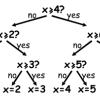
Twenty Guesses: Information Theory
Source Institutions
This activity introduces the idea that computer scientists measure information by how "surprising" a message is.

Pinball Wizard
Source Institutions
In this hands-on engineering project, kids use two simple machines, levers and inclined planes, to construct their own pinball machines.

Basketball
Source Institutions
In this math activity (Page 14 of the Play Ball! PDF), learners play a game of "basketball" and analyze the results of the game.
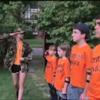
Exercise and Memory
Source Institutions
This activity (page 1 of the PDF under SciGirls Activity: Exercise and Memory) is a full inquiry investigation into the effects of exercise on short term memory.
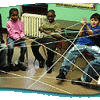
Web of Life Game
Source Institutions
In this game, learners each represent a different organism in an environment. They build a web during the activity, and discover how all the players in an ecosystem depend on each other.
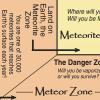
Space Rocks!: A Meteorite Game
Source Institutions
In this board game, learners explore the origins of meteors, meteoroids, and meteorites as well as the their characteristics and importance. They also discover some misconceptions about meteors.

Exploring the Universe: Space Guess Quest
Source Institutions
Space Guess Quest is a fun game that encourages participants to identify the many types of objects in space, from human-made spacecraft to nebulas, galaxies, stars, and worlds.
Shape & Solid Exploration
Source Institutions
In this game, learners use clues to identify mystery shapes. Use everyday objects (like from the pantry) as the shapes.
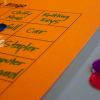
Sound Bingo
Source Institutions
This game is like regular bingo, except the clues are sounds.
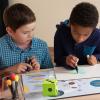
Exploring the Solar System: Mission to Space Board Game
Source Institutions
In this tabletop board game, players will represent a team of scientists and engineers sending a spacecraft on a mission to space.

Tossing Coins
Source Institutions
In this math game (Page 17 of the Are You Game? PDF), learners investigate probability by tossing coins.
Cycles in the Cards
Source Institutions
In this "game," learners explore and relate the evolution of stars to a Navajo creation story. The story is written on a series of cards, which are laid on a table as the story is told.
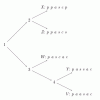
Phylogenetics
Source Institutions
This activity lets learners participate in the process of reconstructing a phylogenetic tree and introduces them to several core bioinformatics concepts, particularly in relation to evolution.

The Carbon Cycle Game
Source Institutions
In this activity, learners take on the role of a carbon atom and record which reservoirs in the carbon cycle they visit.

Mating Game
Source Institutions
In this game (on pages 14-21), learners explore how each human being inherits genetic traits such as eye color.

Football
Source Institutions
In this math activity (Page 10 of the Play Ball! PDF), learners play a game of "football" and analyze the results of the game.
